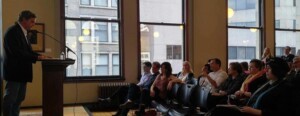David Hicks's Blog, page 3
February 18, 2021
Top Ten Tips–How to Give a Good Reading
How to Give a Good Reading (from someone who used to be a terrible reader)
1. Go short, not long.
We’ve all sat through readings that last way too long. Don’t be that author. Choose a short passage you can read slowly instead of a long passage you’ll feel compelled to rush through. Or choose ten poems instead of twenty. This will help you to relax, but it will also show respect for your host and audience. Reading for ten to fifteen minutes, twenty max, means you’ll have more time to chat during Q&A or during your book signing, which is what your audience really wants anyway. (They want to get to know the person behind the words.)
2. What you read matters as much as how you read.
Choose a passage that showcases your strengths as a writer or poet, and allows us to care for your speaker/main character. Many fiction/nonfiction writers read dynamic scenes with lots of dialogue, but we are generally more drawn to the narrative voice of the work, and to the writer’s portrayal of the main character, than to the plot.
3. Be like Amanda.
Everyone remembers Amanda Gorman’s reading at President Biden’s Inauguration, not only because of her beautiful and inspiring poetry but for how she presented herself—including her stunning outfit and her well-rehearsed delivery. When you present yourself with care, you feel good, and your host and audience will be flattered that you took the event seriously. If you come across as slovenly or unprepared, they might feel insulted—and they won’t bother to buy your book.
stunning outfit and her well-rehearsed delivery. When you present yourself with care, you feel good, and your host and audience will be flattered that you took the event seriously. If you come across as slovenly or unprepared, they might feel insulted—and they won’t bother to buy your book.
4. Be “in your body.”
Before arriving at the site of your reading (because once you arrive, you may not have a second to yourself), eat a good meal and take some time to walk, stretch, or exercise. Then, at the beginning of your reading, “feel your feet,” straighten your shoulders, and take a deep breath before beginning. A reading is as much a physical event as well as a creative/intellectual event.
5. Love your words as you read them.
As I wrote about here, you should read your own words with at least the same emotional investment as you would read the words of your favorite author or favorite book. Because if you don’t love your words as you read them, then why would you expect your audience to love them?
6. Style matters.
Modulate your voice naturally (not overdramatically–this is a reading, not a puppet show), both in volume and pitch. Project out to the rear of the room, as if you didn’t have a microphone in front of you. (Don’t mumble, thinking the mic will pick it up and project it–it won’t.) Don’t laugh at your own jokes, emote with your characters, or imitate their voices or accents—you’ll sound like a Monty Python skit—but do alter the cadence and tone so as to match the character’s personality and situation. In other words, be emotionally engaged but not theatrical—it’s a bookstore, not a stage.
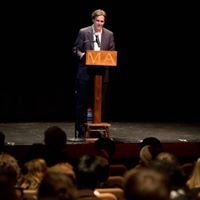 7. B
e. Prepared.
7. B
e. Prepared.
Don’t just show up, open your book, and read from it. You’re not that cool yet. Plus, you don’t know if the lighting will be good enough for you to read the small print of your book, and it’s easy to lose your place on a single-space page of a paperback. Instead, always have a marked-up “reading copy” of your book with you, with explanatory notes and markers for where you should start and where you should pause, whether to signal the end of a scene, or to allow the audience to “digest” an important sentence or laugh at a funny line. Use your finger to follow the text, as children do when they learn to read, or print out a double-spaced version of your reading selection in large font, so that you don’t lose your place . And for heaven’s sake, don’t read from your phone. The optics are terrible, and the message it sends to your audience is that you didn’t care enough to take the time to prepare for this event.
8. It’s a relationship, not a lecture.
Before, during, and after the reading, take a moment to “read the room.” Obviously, for you, it’s an important event, but it is for them too. They’ve taken the time to show up for it, to demonstrate their support for you, or to enjoy a date with a friend or loved one, or because they’re fans of your work and they finally get to “meet the author.” And for your host, this is important as well. It’s taken a great deal of effort to plan and publicize this event, and they’re hoping it will result in some revenue, bring new people to their store for the first time, and add to their reputation as a place that contributes to the local arts scene. So begin and end your reading by expressing your gratitude to your hosts and to the audience. Acknowledge the importance of everyone’s time. And afterwards, send your host a thank-you card. It may seem trite, but everyone likes to be appreciated, and they’ll remember you as a nice author they would welcome to their store again, when your next book is published.
9. How do you get to Carnegie Hall?
You can’t possibly give a good reading without practicing first. My advice on how to do so may be found here.
Hey, you’re giving a reading! Isn’t this a dream come true? So enjoy it, and if you do, everyone else will enjoy it with you. And remember, whereas you might be nervous about your “performance,” they’re very happy and excited to be there, excited to relive that wonderful childhood experience of listening to someone reading them a story. Think about it—have you ever heard anyone boo after a reading? So enjoy the experience. In other words, don’t bury your head in your book and come up for air at the end. And don’t worry if only a few people show up; those few people will be your fans for life; one of them may end up writing a positive review of your book; and in the long run, it’s better to give a great reading to three people than a bad reading to a hundred people.
Bonus Tip–The Contents of My “Reading Backpack”
Or, What I Brought with Me to Every Reading on my 50-Stop Book Tour.
The “reading copy” of my book, marked up for pauses and length (10-minute, 15-minute, and 20-minute excerpts).Five additional copies of my book (just in case the bookstore sells out); plus a box of books in the trunk of my car.Reading glasses, in case the lighting is dim, and for the same reason, a small ‘reading flashlight.”Credit-card reader (for when I sell my own books, e.g. when I give a reading at a cafe, pub, or a friend’s house).My favorite signing pen, with five back-up (black ink) pens.Printed-out hard copies of my reading excerpts (double-spaced, 14 font) on 8 x 11 paper.My “writing credit card” that I used exclusively any expenses–gas, accommodations, book purchases, food–incurred before, during, and after every reading. (It’s all deductable.) Alternatively, bring a pouch for receipts.An 8”x11” cardboard custom-made printout (I used Vistaprint) and stand, in case I have a signing table and my host doesn’t have a sign or poster.A box of thank-you cards (Vistaprint again), with an image of my book cover on the cards, and a book of stamps.Hard copies of my own introduction. (Because sometimes the person who introduces me simply read from a Google search or the back of my book, whereas my version included more detail and more recent information, like quotes from reviews of my book.)Business cards with my book cover on the front (Vistaprint).Water bottle.
Do any authors or reading attendees out there have additional tips? Please comment below, and thanks!

How to Give a Good Reading
Top Ten Tips on How to Give a Good Reading
1. Go short, not long.
Choose a short passage you can read slowly instead of a long passage you’ll feel compelled to rush through. This will help you to relax, but it will also show respect for your host and audience. Reading for ten to fifteen minutes, twenty max, usually does the trick. Then you’ll have more time to chat during Q&A or your book signing, which is what your audience really wants anyway.
2. What you read matters as much as how you read.
Choose a passage that showcases your strengths as a writer and allows us to care for your main character and your story. Many authors read a dynamic scene with a lot of dialogue, but when I go to a reading I find that I am more drawn to the narrative voice of the work, and to the writer’s portrayal of the main character, than to the plot.
3. Be like Amanda.
Everyone will remember Amanda Gorman’s reading at President Biden’s Inauguration, not only because of her beautiful and inspiring poetry but for how she presented herself—including her stunning outfit and her well-rehearsed delivery. When you present yourself with care, you feel good, and your host and audience will be flattered that you took the event seriously. If you come across as slovenly or unprepared, they might feel insulted—and they won’t bother to buy your book.
stunning outfit and her well-rehearsed delivery. When you present yourself with care, you feel good, and your host and audience will be flattered that you took the event seriously. If you come across as slovenly or unprepared, they might feel insulted—and they won’t bother to buy your book.
4. Be “in your body.”
Before arriving at the site of your reading (because once you arrive, you may not have a second to yourself), eat a good meal and take some time to walk, stretch, or exercise. Then, at the beginning of your reading, “feel your feet,” straighten your shoulders, and take a deep breath before beginning. A reading is as much a physical event as well as a creative/intellectual event.
5. Love your words as you read them.
As I wrote about here, you should read your own words with at least the same emotional investment as you would read the words of your favorite author or favorite book. Because if you don’t love your words as you read them, then why would you expect your audience to love them?
6. Style matters.
Modulate your voice naturally, both in volume and pitch. Project out to the rear of the room, as if you didn’t have a microphone in front of you. Keep your voice engaged, but don’t overdo it. Let your words do their work. Don’t laugh at your own jokes, emote with your characters, or imitate their voices or accents—you’ll sound like a Monty Python skit—but do alter the cadence and tone so as to match the character’s personality and situation. In other words, be emotionally engaged but not theatrical—it’s a bookstore, not a stage.
 7. B
e. Prepared.
7. B
e. Prepared.
Don’t just show up, open your book, and read from it. You’re not that cool yet. Plus, you don’t know if the lighting will be good enough for you to read the small print of your book very well, and it’s easy to lose your place on a single-space page of a paperback. Instead, always have a marked-up “reading copy” of your book with you, with explanatory notes and markers for where you should start and stop, where you’ll allow the audience to “digest” an important sentence, or laugh at a funny line, or signal the end of a scene. Also, use your finger to follow the text, as children do when they learn to read, or print out a double-spaced version of the book chapter in large font, in order to decrease the odds that you will lose your place while reading. And for heaven’s sake, Don’t read from your phone. The optics are terrible, and the message it sends to your audience is that you’re unprepared.
8. It’s a relationship, not a lecture.
Before, during, and after the reading, make sure to “read the room.” Obviously, for you, it’s an important event, but it is for them too. They’ve taken the time to show up for it, to demonstrate their support for you, or to enjoy a date with a friend or loved one, or because they’re fans of your work and they finally get to “meet the author.” And for your host, this is important as well. It’s taken a lot of time—more than you think—to plan this event and to publicize it, and they’re hoping it will bring them some revenue, bring new people to their store for the first time, and add to their reputation in their neighborhood as a place that contributes to the local arts scenes. So begin your reading by expressing your gratitude to your hosts and to the audience. Acknowledge the importance of everyone’s time. And a week or two later, send your host a thank-you card. It may seem trite, but it actually means a lot. And they’ll remember you as a nice author they would welcome to their store again, when your next book is published.
9. How do you get to Carnegie Hall?
My advice on how to practice for a book tour may be found here.
10. Have fun!
Hey, you’re giving a reading! Isn’t this a dream come true? So enjoy it, and if you do, everyone else will enjoy it with you. And privately remind yourself that whereas you might be nervous about your “performance,” they’re very happy and excited to be there, excited to replicate as adults that wonderful childhood experience of sitting on the library floor and being read to. Think about it—have you ever heard anyone boo after a reading, or say something critical afterwards? So enjoy the experience. In other words, don’t bury your head in your book and come up for air at the end. And don’t worry if only a few people show up; those few people will be your fans for life, and in the long run, it’s better to give a great reading to three people than a bad reading to a hundred people.
Bonus Tip–The Contents of My “Reading Backpack”
The “reading copy” of my book, marked up for pauses and timed readingsFive additional copies of my book (just in case the bookstore sells out); plus a box of books in the trunk of my carReading glasses, in case the lighting is dim, and for the same reason, a small ‘reading flashlight”Credit-card reader (for when I sell my own books)Five good pens with black ink (for signing)Printed-out hard copy of my reading excerpt (double-spaced, 14 font) on 8 x 11 paperMy “writing credit card” that I used solely for gas, accommodations, book purchases, food, and any other expenses to and from the reading, so I can deduct all expenses from my taxes. (Alternatively, bring a pouch for all receipts.)An 8”x11” cardboard custom-made printout (I used Vistaprint) and stand, in case I have a signing table and my host doesn’t have a sign or posterA box of thank-you cards (again by Vistaprint), with an image of my book cover on the cardsHard copies of my own introduction. (Because sometimes the person who introduces me simply reads from a google search, whereas mine includes more detail and more recent information, like quotes from reviews of my book).Business cards with my book cover on the front (by Vistaprint).Water bottle.

Love Your Words
Months before I went on my book tour, I was nervous about reading in public—I tend to mumble, and have never been a good storyteller—and I knew I needed to practice first. So my wife came up with the idea of hosting a couple of reading parties. We invited some literary friends, provided pizza and beer, I set up a “podium” (a music stand) in front of the fireplace, and gave my friends a reading—or more accurately, six short readings from my book over the course of those two evenings. After each reading, our friends wrote mini-critiques, of both my selections and my delivery.
I received some very good advice about the passages I was thinking of reading during the book tour—there was an overwhelming consensus regarding which excerpts hit and which ones missed—and about my delivery, too, mostly different versions of “SLOW DOWN!” But the most helpful advice came from my musician friend Fabrice, who wrote, “You need to love your words.”
When I talked with him later, he said I sounded bored with my own writing, and when he told me this, he seemed angry with me, as if I had violated some unwritten commandment: Thou shalt never perform without passion. “Next time, pretend you’re reading something by an author you love,” he suggested, “like Yeats or Faulkner or Morrison.”
He was right, of course. As an English professor, whenever I read from a work I love, there is no disguising my feelings for it. To this day I have been unable to read the ending of James Joyce’s “The Dead,” an Edna St. Millay sonnet, or Francesca’s story in Canto V of Dante’s Inferno (in the original terza rima, mind you), without getting choked up. Why, when I read my own work, do I sound so bored or embarrassed?
Well, I certainly could go on here about how, as a good Catholic, I was trained to think of others before myself, to be humble and deferential, and never to “show off” (because vanity is a sin), but at my age that would be a hollow excuse. The truth is, reading my own work in public was quite different from reading the work of others—more confession than liturgy, if you will—so as with any other new venture or skill, I needed to learn how to do it. I needed to go back to school.
Enter Janna Goodwin.
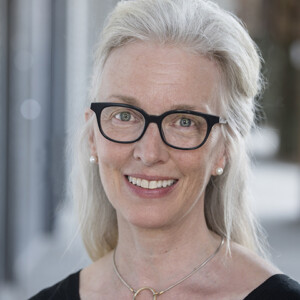 My friend Janna, a writer/actor/director/producer/professor, is an excellent public speaker, and she teaches Communication for a living. So she very kindly gave me a private lesson—feel your feet, look up, project out to the last row, mark pauses in the text, wait for laughs, and so on. And at one point, she said something like, “And, you know, feel it, man.”
My friend Janna, a writer/actor/director/producer/professor, is an excellent public speaker, and she teaches Communication for a living. So she very kindly gave me a private lesson—feel your feet, look up, project out to the last row, mark pauses in the text, wait for laughs, and so on. And at one point, she said something like, “And, you know, feel it, man.”
I wasn’t.
But here’s the thing: I do feel it. I do love my words. For that matter, I’m completely in love with my stories. This ain’t no infatuation; it’s a long-term, completely committed relationship. I was in love with my first book, White Plains, for over a decade, and I love it still. More lately I’ve been carrying on a four-year love affair with my new novel, The Gospel According to Danny. And I’m currently smitten with the rough draft of a novella, set in Prague—in fact, we can’t wait to start dating regularly!
But I certainly wasn’t conveying any of that as I read.
I would like to say here that after Fabrice’s advice, after Janna’s coaching, and after watching videos of authors who read their work well (as you may suspect, there aren’t too many), I became an electrifying reader, and hundreds of people showed up at my appearances to bask in the symphony of my words. But these things take time and practice. To repeat is to learn. What I can say is that over the course of that book tour, I steadily improved my reading skills, and learned a great deal from watching my fellow readers—Sophfronia Scott’s confident delivery, the gentle intimacy of Harrison Candelaria Fletcher’s voice, the composed camaraderie of Leni Zumas. Yes, on some evenings, I let my anxieties take over and I read my words too quickly, or without much confidence, to say nothing of love. 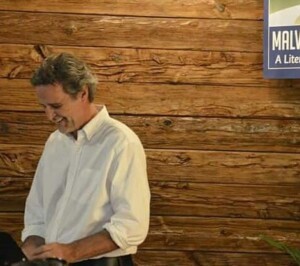 But on other evenings, I chose a passage I especially liked, planted my feet firmly behind the podium, smiled to the audience, projected and modulated my voice, and pretended I was reading the work of an author I loved–or even better, read with patience, faith, and yes, with love for my own words. And it was fun!
But on other evenings, I chose a passage I especially liked, planted my feet firmly behind the podium, smiled to the audience, projected and modulated my voice, and pretended I was reading the work of an author I loved–or even better, read with patience, faith, and yes, with love for my own words. And it was fun!
And—no coincidence—on those evenings, I sold more books.
Now, as a reader, professor, and director of a creative writing program, I can tell—can’t you?—when something has been written or read without love. The words are flat on the page, and hearing them read out loud puts me to sleep. And as a writer, now, I choose my words with more tenderness, and feel even more affection for my characters, even when—especially when—they are screwing up or behaving badly. And I don’t consider a work complete until I’ve read it out loud, twice: first to hear any missteps in wording or rhythm, then again to make sure I can read every paragraph with affection.
Because Fabrice was right—if I am not in love with my words, why would anyone else be?
Click here for some tips on how to give a good reading.
An earlier version of this blog post first appeared at daddyelk.com

October 10, 2020
Back East
I recently started a new position at Wilkes University in Wilkes-Barre, PA, as the new Director of the Maslow Family Graduate Program in Creative Writing, and while it’s been a strange experience to meet my new colleagues via Zoom, or masked and socially distanced, I have nonetheless received a warm welcome from them, and from the brilliant writers in the Wilkes program. Cynthia and I will be close to our families now, and that, in addition to enjoying the familiar chill of the autumn air (here’s to deciduous trees!) and being a short drive to Manhattan and the Atlantic Ocean, is making me quite happy; while at the same time I sorely miss my dear students, friends and colleagues in Colorado.
Oddly enough, Regis and Wilkes have the same school colors, so on some days, I wear the face masks from both universities. After all, a scholar of 19th Century American Literature, I appreciate blatant symbolism.
If you’d like to read more about my big move, here’s my post on “The Write Life,” currently edited by Kristin Ivey.

May 4, 2020
New Beginnings
Spring is traditionally a time of new beginnings, and this spring is no different. But oh, what a difference.
This spring, new beginnings are tied to new difficulties and new endings—the difficulties of living in quarantine, of keeping our distance from our loved ones, even when they fall ill; and the ending of so many lives, of our way of life.
There has always been death and devastation. It’s just that this time, it’s at our doorstep. To succumb to it, to whirl inside its force, is to lose your life while living.
So on the cusp of sixty, even in the midst of these difficulties and endings, I am not succumbing; I am adapting and moving forward. I am re-beginning.
My wife and I have decided to move back east, so we can be closer to our families after living two thousand miles away for twenty years. Thus in the very midst of the pandemic, we are preparing to change locations, change jobs, change lifestyles.
This was an extraordinarily difficult decision. We love Colorado, and we love the dear friends we’ve made here. And while we are by no means leaving for good–we’ll be back often, to visit Stephen, to hike the mountains, to visit with our friends, and who knows, maybe to live here again–it is certainly the end of something. But at the same, it’s a new beginning for us and our families: we’re excited to see them more often, to care for our parents if and when they need our care, to spend fun weekends in our favorite city, and to vacation with them–especially by the ocean, which I sorely miss.
This will also signal a new beginning for our relationship, which has already evolved (beautifully) during our cross-country quarantining experience of the last two months, first in Prague, then back home in Colorado. “Stuck” with each other in Prague as the quarantine went into effect , and then again when we were sent home to another quarantine at the end of March, we learned to live differently, less distracted and less busy, with more quiet time together, more focus. We have spent pretty much every hour of every day together for the past two months, and haven’t had a single difficult moment; indeed we have relished this opportunity to enjoy each other’s company, whether on a long walk, or reading, or doing yard work, or binge-watching a TV show, or cooking for each other, or enjoying zoom happy hours with friends and family. And we have given each other space for doing our jobs or engaging in creative projects. And I’m going to try to stay this way–less busy, less stressed, and devoting several hours a day to my writing–from now on, even with the stress and excitement of a new job (I will be directing the MFA program at Wilkes University) looming ahead.
This will signal a new phase in my life as a parent as well. Cait moved to Chicago last year, and now we’ll be living far from Stephen. This, then, will be the most emotionally difficult part of our move. Having lived apart from one another for years during their childhoods, our relationship was revived and strengthened (a definite re-beginning) when they attended Regis (where I currently work) for college and then remained in Denver after they graduated. Now, I will be doing my best to maintain our strong and beautiful bond while living far from them both . Another beginning.
And finally, I am re-beginning my career as a writer. I just finished a new novel that has taken me years to complete, and while my agent shops it around, I have started another. My three novels, then, will be very different from one another–the first (White Plains) a novel-in-stories, the second an attempt at an American epic, the third a simple novella, set in Prague. And after the third is done, probably by this summer, I have another in mind, a book of true crime.
In other words, I am creatively re-energized. I want always to improve as a writer, to grow with each book. And I’m eager to continue to write stories that bring meaning to, and hopefully grace, my readers’ lives.
In short, I am not hiding in a corner, waiting out this pandemic, or fearful of aging. I am paying attention to the beauty in all of us as well as the evil in our midst, and I am reminding myself, every day, that both are at once omnipresent and true. I am taking precautions, but am putting neither my inner life nor outer life on hold. I am going outside, every day, opening my heart to the budding trees, bushes, and flowers in a way I never did when I was young. I am writing every day (an act of faith, of love, a grounding meditation in itself), doing my best to convey the beauty that flourishes in spite of, or even because of, disease and misery. I am staying open when everything inside me wants to close up shop. I am waking up grateful, every day–for my wife, my children, my students, my family, my in-laws, and friends, and I am sending out my sorrow, my concern, my love, to them all. And acting in this manner, as opposed to being overwhelmed and busy and distracted every day, is a new way of life for me, truly a new beginning.
Who knows how many years I have left? I refuse to sit around, worrying or whining. Instead I vow to accept our current bizarre situation, take care of myself and my loved ones, do the things I love, and be the best person (and the best husband, father, brother, son, son-in-law, professor, director, dog-owner, neighbor, and friend) I can be. And continue to grow, and evolve, even as I age, in spite of the molecules of death floating all around me–taking my cue from nature, inured to or indifferent to this contagion, continuing to blossom and grow.

The post New Beginnings appeared first on David Hicks - Author.
April 18, 2020
Cross-Continental Quarantining
I was in Prague on a Fulbright scholarship, teaching at the venerable Charles University and living in the Letna/Holesovice neighborhood called Prague 7. My first month, February, was gray and rainy, and therefore productive: I finished a novel and taught my classes in the beautiful Faculty of Arts building in Old Town, in a classroom overlooking the Jewish Cemetery. There were some places I longed to visit, like the Klementinum Library (near the Faculty of Arts building) and the Edgar Allan Poe exhibit at the National Gallery (a short walk from my apartment), but there would be plenty of time for that, I thought. Five months, in fact. I would save it all for when Cynthia arrived in early March.
And then she arrived. And so did the COVID-19 virus. And so did a friend, arriving from London for a visit. And then the Czech schools were shut down, including Charles University and the beautiful elementary school across the street from my apartment. And then there was a flight ban, and then bars and restaurants were closed, and then there was a quarantine, and then we had to leave.
When the university was closed, with only twenty-five cases in the country, my initial reaction was disbelief. A smirk, even. These people are panicking for no reason. But how wrong I was. Taking their cue from countries that had learned from the SARS outbreak and knew that the most efficient response was immediate social distancing, and aware that their little country, surrounded by open and porous borders with Germany, Slovakia, Austria, and Poland, had already seen thousands of citizens exit and re-enter, including for ski vacations in the new epicenter of the virus, northern Italy, they quickly and decisively shut everything down.
Meanwhile, no such measures were being taken back home in the U.S.
On March 13, after the pubs, restaurants, museums, most workplaces, and shops were to close “indefinitely,” Cynthia and I did the only sane thing we could do: we walked to Lokal, our favorite pub (which receives a daily delivery of freshly-brewed pilsen and serves it in large mugs, frothy and delicious, along with a species of fried cheese that sends us into a state of delirium), sat at a corner table five feet away from anyone else, and feasted. 
Earlier that day, I had received a letter from the U.S. Ambassador to the Czech Republic: the U.S. had announced a ban of all flights from Europe, the Fulbright program was being suspended as of March 31, and we were “strongly urged” to return home. Cynthia and I had spent all day trying to decide what to do. Should we cut short our dream semester, risk multiple cancellations, risk getting stuck overnight in a European city in a worse situation than ours (all flights from Prague to the U.S. went through virus-plagued Europe), risk catching the virus on one of the three flights we’d have to take, or, worse, unknowingly infecting others? Or should we stay put?
We guessed that because of the different reactions of the two governments, things might be getting worse in the U.S. just as they would be improving in the Czech Republic—but who knew? They are two completely different countries, in terms of both geography and personality. It seemed an impossible decision.
On the one hand, we were thousands of miles from home. During a pandemic. Thousands of miles from our parents, our children, our friends, our neighbors (including a dear friend with cancer), worrying about them constantly. What would we do if one of them were to fall ill? And if we stayed put and caught the virus, how would we negotiate a crowded hospital without knowing the language? And what if the shutdown lasted until the fall, or even longer?
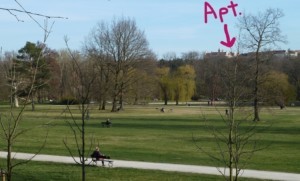 On the other hand, we seemed to be in a good situation. We had chosen a great apartment, right next to the largest park in the
On the other hand, we seemed to be in a good situation. We had chosen a great apartment, right next to the largest park in the 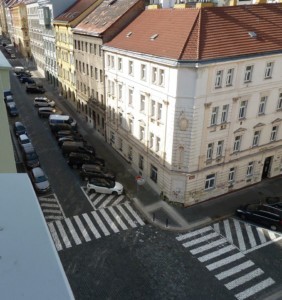 city, Stromovka (the arrow on the photo points to our building), which dates back to 1268, a park with steep hills, well-groomed paths, and wide pathways on which to stroll or bike—in other words, an easy place to walk around without ever bumping into anyone. Which we were doing, every day.
city, Stromovka (the arrow on the photo points to our building), which dates back to 1268, a park with steep hills, well-groomed paths, and wide pathways on which to stroll or bike—in other words, an easy place to walk around without ever bumping into anyone. Which we were doing, every day.
Also, we had learned that the Czech Republic, with a two percent unemployment rate and a populace that supports local farmers (most Czechs get their produce at farmers’ markets, not at the supermarket), is largely self-sufficient: the grocery stores were well stocked, and I already had an account with a internet-based grocery-delivery service called Rohlik, which had been up and running for years and knew just what to do with a suddenly ramped-up demand. Within three blocks of our apartment building were two mid-sized grocery stores and plenty of smaller shops selling essentials—six convenience stores, a fresh-produce shop, a vegan food store, a bakery that was now selling fresh pastries, lasagna, and bread at their doorway, an Italian deli, and three pharmacies—and not one had more than a few people in it at any one time. When we contrasted this situation to what we were hearing from our friends back home (the wiped-out shelves at grocery stores, people either hoarding or desperately seeking toilet paper) it seemed wiser to simply stay put. (One day when it looked as if we might need toilet paper in the near future, I donned a face mask, walked to the end of our block, bought a pack of sixteen rolls, and was back home within five minutes.)
Moreover, the Czech people were born for social-distancing. Well before the COVID-19 outbreak, I had noticed the locals tended to mind their own business. In the halls and stairway of our apartment building, residents smiled and greeted one another (“Dobry den!”), but out in the streets, there were no such interactions. When I passed people on the sidewalk, they kept their eyes down, or forward, and went about their tasks. (Once I was stunned to see three young people at a tram stop, hugging each other and talking loudly, but then quickly realized they were Italian.) So I could be certain, any time I left the apartment, I would not come into close contact with anyone.
Another consideration was financial: we had rented the apartment for five months, and the cancellation penalty was stiff; we’d have to pay that penalty and buy a new one-way flight. (The airlines we flew to get to Prague were no longer making trips from Europe.) And back home, a friend of ours was renting our house, so we would lose that income as well. And what would he do if we suddenly announced we were coming home?
And finally, we had made friends in Prague, especially two of my colleagues at Charles University and 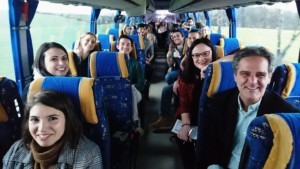 several of my Fulbright scholars, along with dozens of young Fulbright Teaching Assistants, kindhearted and smart, as much in love with the country as we were; and most of them were staying put. The Czech Fulbright Commissioners, too, had become our friends, giving us support, guidance, and yes even love, every day. In other words, if we were to stay, we wouldn’t feel alone.
several of my Fulbright scholars, along with dozens of young Fulbright Teaching Assistants, kindhearted and smart, as much in love with the country as we were; and most of them were staying put. The Czech Fulbright Commissioners, too, had become our friends, giving us support, guidance, and yes even love, every day. In other words, if we were to stay, we wouldn’t feel alone.
Unable to decide, we had come up with a short-term plan that would buy us some time: we had booked a flight home with a full-refund-within-24-hours policy, just in case. Then we went to Lokal, ordered two frothy glasses of Pilsen, and continued to deliberate. Maybe we could fly back to Colorado, then return to the Czech republic for the months of May and June? But what if the pandemic hasn’t eased by then? Or what if it eased in the Czech Republic but worsened in the U.S. and the Czech Republic banned flights from the U.S.?
Then again, no matter how long it took, if it meant being able to come back to this pub and to drink this beer again, it would be totally worth the wait.
The next day, we canceled that reservation. Taking that flight, or any flight that weekend, seemed less safe than staying put. There were reports of hellaciously long lines at the U.S. airports, because thousands of Americans were returning home at the same time, on a limited number of flights. We decided to wait and see.
Then on March 16, the eleven million citizens of the Czech Republic, along with any remaining foreigners, were placed in quarantine.
Thus began our new life together, in isolation.
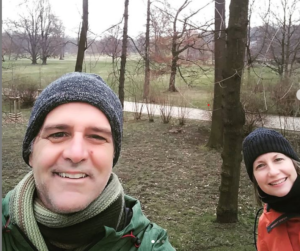 Cynthia was our researcher, reading multiple news sources and tracking flight availabilities (dwindling by the day). I continued to prepare for my classes (now on line) and working on my novel, treating the quarantine as a government-imposed writing retreat.
Cynthia was our researcher, reading multiple news sources and tracking flight availabilities (dwindling by the day). I continued to prepare for my classes (now on line) and working on my novel, treating the quarantine as a government-imposed writing retreat. Cynthia and I woke up every morning, checked in with each other regarding our health, expressed our gratitude for being alive and well and able to work through this thing together, took a long walk in the park, worked, cooked up some delicious meals, and spent our evenings chatting over a cup of tea.
Cynthia and I woke up every morning, checked in with each other regarding our health, expressed our gratitude for being alive and well and able to work through this thing together, took a long walk in the park, worked, cooked up some delicious meals, and spent our evenings chatting over a cup of tea.
Then, after a week of quarantine, our decision was made for us, by way of a second letter from the U.S. Ambassador: the Fulbright program was being suspended, the U.S. Embassy was closing up shop, there would soon be no more flights leaving Prague, and we really needed to leave. Now.
We booked one of the last flights out of Prague.
Then, the women of the Czech Republic Fulbright Commission, who had been working around the clock and who’d been in contact with us every day, providing 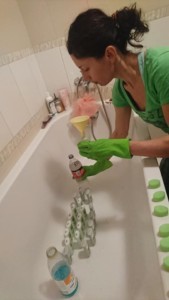 guidance and information and even hand-sewn face masks, became not only the best Fulbright Commission in all of Europe but our dear friends, our heroes. The day before our departure, Kristyna concocted dozens of travel-sized hand disinfectants for us; Hanka (the Executive Director herself) walked over to our apartment to bring us more face masks; and Klara stopped by to pick up some books for me. I handed Klara the books, and she handed me a package of delicious oranges and a bag of Czech candy. We were both wearing masks, and I couldn’t shake her hand in gratitude, but we hugged each other with our eyes.
guidance and information and even hand-sewn face masks, became not only the best Fulbright Commission in all of Europe but our dear friends, our heroes. The day before our departure, Kristyna concocted dozens of travel-sized hand disinfectants for us; Hanka (the Executive Director herself) walked over to our apartment to bring us more face masks; and Klara stopped by to pick up some books for me. I handed Klara the books, and she handed me a package of delicious oranges and a bag of Czech candy. We were both wearing masks, and I couldn’t shake her hand in gratitude, but we hugged each other with our eyes.
The next day, we, along with fellow Fulbright scholar Tara and some of the wonderful Fulbright English Teaching Assistants who had been living in small towns since August (teaching English in the local high schools), went to the nearly-empty airport in Prague and flew in a nearly-empty plane to London/Heathrow.  Then we boarded a packed, ten-hour flight from London to Dallas, passed through an almost non-existent check-in (a government employee asked us if we felt sick and reminding us to quarantine ourselves for fourteen days), and boarded a nearly-empty flight from Dallas to Denver. In Prague, everyone in the airport had worn face masks and kept their distance, but in London and Dallas, nobody did either.
Then we boarded a packed, ten-hour flight from London to Dallas, passed through an almost non-existent check-in (a government employee asked us if we felt sick and reminding us to quarantine ourselves for fourteen days), and boarded a nearly-empty flight from Dallas to Denver. In Prague, everyone in the airport had worn face masks and kept their distance, but in London and Dallas, nobody did either.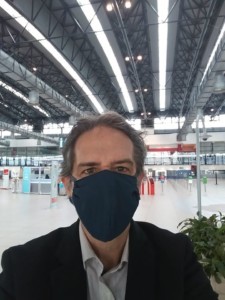
Cynthia and I kept our masks on and kept sanitizing our hands, unsure if such measures were protecting us or protecting the other passengers from us. But whatever the reason, we didn’t catch the virus.
When we arrived in Denver, after eighteen hours of travel, we found our car, which our friends (thank you, Lynetta and Jeremy) had driven to the airport and parked for us. We arrived home around one a.m., laughed when our dog Rosie came galloping out from our neighbors’ house in the dark of night to greet us, silently thanked Paul (our friend and renter) for cleaning the house for us and evacuating on such short notice, and fell asleep.
So now, once again, we’re in quarantine. And after this post-flight, fourteen-day quarantine is up, the state of Colorado will be in quarantine. So, this is our life now: a triple-quarantine.
But really, how lucky we are! We’re both alive and well. Our families (even, miraculously, my forty or so relatives in Italy) are fine. And we have a sweet little house, with quiet streets and a park just a block away. A former student is buying groceries for us and delivering them to our door. Our neighbors, who have chickens, are giving us eggs. A local farmers’ collective is delivering greenhouse-grown produce. And we both still have our jobs and can keep working at them, thanks to the internet.
But we sure do miss Prague. Cynthia and I had fallen in love with the city during a visit ten years earlier, and the cobblestones, the architecture, the river, the hills, still captivated us—in some ways even more so, assuming we had months, and not just days, to enjoy our new home. But it was all cut short.
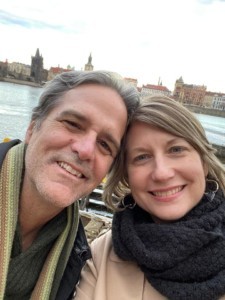

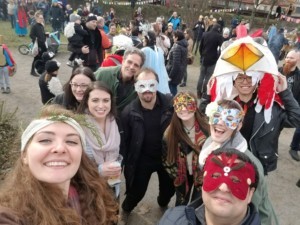
But what can you do? We let ourselves be sad for a day or two, but then we got right back into our “quaranroutine”: We wake up, check in with each other regarding our health, express our gratitude for each other, take a long walk, do our work, and spend out evenings chatting over a cup of tea—and watching television. We zoom-chat with our families in the afternoons. And I write every day, and teach my Czech students on line, while Cynthia works online as well. And every day, I am thankful to be married to my best friend.
Quarantine, schmarantine. We got this.
As for Prague, dearest Praha: Brzy se vrátíme.
[This blog post first appeared on www.daddyelk.com.]

The post Cross-Continental Quarantining appeared first on David Hicks - Author.
September 24, 2019
David’s Interview with V.S. Kemanis
In her review of White Plains, V.S. Kemanis calls the main character Flynn “the most fully-drawn character I’ve seen anywhere.” Read her interview with David here.

The post David’s Interview with V.S. Kemanis appeared first on David Hicks - Author.
March 24, 2019
Hicks to Give Keynote Address at GEOCON, June 28 2019
On June 28, 2019, David Hicks will give the keynote address at the 2nd Annual GEOCON, an independent writer’s conference that takes place in the Rocky Mountain National Historic Landmark District town of Georgetown, Colorado. GEOCON strives to help independent authors successfully publish, connect with, and learn from successful authors and industry professionals in an intimate environment.

The post Hicks to Give Keynote Address at GEOCON, June 28 2019 appeared first on David Hicks - Author.
October 12, 2018
Hicks to Be Featured at Sleepy Hollow Lit Fest in May
On Saturday, May 18, David will be appearing at the First Annual Sleepy Hollow Lit Fest in Tarrytown, NY. David will be reading from his novel White Plains, signing books, and haranguing visitors about the true meaning of Washington Irving’s stories. If you live the tri-state area, please stop by!

The post Hicks to Be Featured at Sleepy Hollow Lit Fest in May appeared first on David Hicks - Author.
August 15, 2018
The Arapahoe Libraries’ Kickoff Event Is a Hit!
The “Kickoff” of the Arapahoe Libraries” 2018 “Village Read,” featuring David Hicks’s debut novel WHITE PLAINS, was a smashing success, featuring an interview by Greenwood Village Mayor Ron Rakowsky and a series of intelligent questions by audience members, many of whom had already read the book. Read the newspaper write-up of the event here.

The post The Arapahoe Libraries’ Kickoff Event Is a Hit! appeared first on David Hicks - Author.

